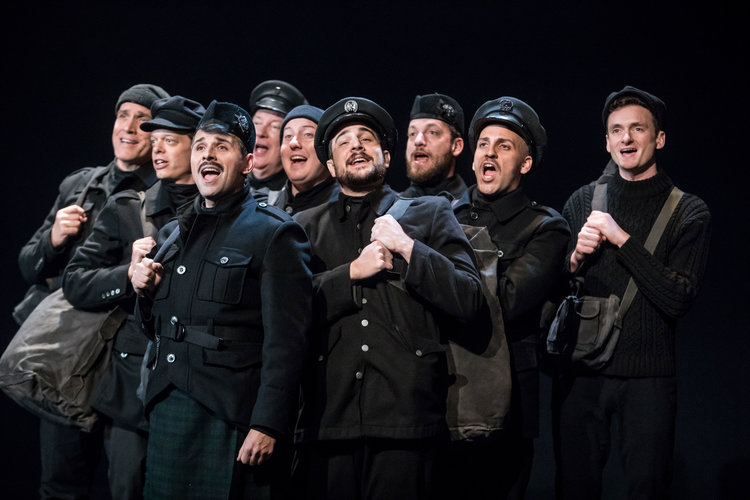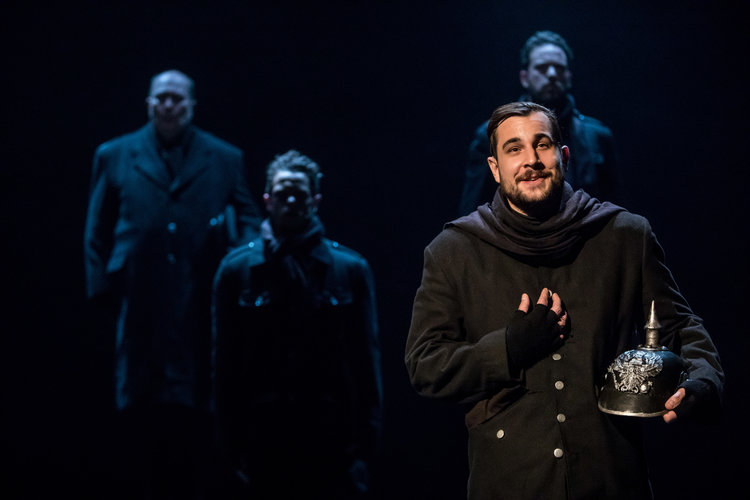Review: Peter Rothstein's Extraordinarily Moving and Beautifully Realized ALL IS CALM: THE CHRISTMAS TRUCE OF 1914
Shortly after midnight, on Christmas Day of 1914, a German soldier whose name is now lost to history committed what might be the most subversive act in all of modern warfare. He walked, unarmed, out of the front line trenches and into the middle of No Man's Land, faced the enemy British soldiers before him and, in his native tongue, began singing "Silent Night."

James Ramlet, Evan Tyler Wilson, Benjamin Dutcher,
Tom McNichols, Rodolfo Nieto, and Riley McNutt
(Photo: Dan Norman)
As described by witnesses, a British soldier walked out of his army's trenches to meet him and make it a duet.
History tells us there was an unusual amount of civility between combating armies stationed on the front lines of Flanders Fields during the early months of what we now call World War I. With soldiers on both sides enduring the same muddy, rat-infested, disease-laden conditions, a kind of camaraderie formed, especially since soldiers were close enough to shout out greetings to each other. Hostilities would regularly stop so that the bodies of fallen comrades could be gathered and food could be obtained. The sounds of late night singing frequently permeated the darkness.
So perhaps it shouldn't be a surprise that during the early minutes of the war's first Christmas, thousands of tired and homesick young men, mostly low-ranking foot soldiers, ignored the orders of their superiors to humanely celebrate the holiday with the people their country had sent them out to kill; singing carols, exchanging small tokens as gifts and even, in at least one sector, playing a spirited football match.
High-ranking officials were furious to learn of this open display of fraternization and news of it was suppressed and censored as much as possible. But the men who were there wrote about the event in journal entries and in letters to loved ones. These written accounts make up the spoken text for Theater Latté Da's extraordinarily moving and beautifully realized theatre piece, All Is Calm: The Christmas Truce of 1914.

(Photo: Dan Norman)
Crafted together and directed by Peter Rothstein, ALL IS CALM is performed by an ensemble of ten male actor/singers who play multiple roles of various dialects. The story experienced by thousands is told by piecing together quotes that are directed to the audience. Spoken words are intertwined with a cappella singing for the entirety of the piece's 75 minutes.
The initial excitement and patriotism of young Englishmen going to war prompts choruses of "Come On And Join" and "God Save The King." The effort to keep a stiff upper lip when faced with the grim reality of battle is expressed by melodies like "It's A Long Way To Tipperary," "Pack Up Your Troubles" and "Keep The Home-Fires Burning."
When innocent chaps who were designated as enemies embrace in friendship, the air is filled with both German and English versions of traditional carols such as "The First Noel," "Good King Wenceslas," and "Angels We Have Heard On High."
The gentlemen of the company (Sasha Andreev, David Darrow, Benjamin Dutcher, Ben Johnson, Mike McGowan, Tom McNichols, Riley McNutt, Rodolfo Nieto, James Ramlet and Evan Tyler Wilson) sound just gorgeous singing the arrangements by Timothy C. Takach and music director Erick Lichte.
The music is nearly non-stop with no breaks for applause, allowing the incredible story to take precedence. Whenever possible, the names of each soldier quoted is mentioned, a touching honor giving the piece even greater authenticity.
"It was as if we had decided to end the fighting all by ourselves," wrote Sgt. G. H. Morgan of the Royal Warwickshire Regiment. "Could it really have happened like this? If all the troops all along the line had refused to fight, on both sides, would the war have ended there and then? If we had all walked away at that point, could the result have been a truce?"
But the soldiers followed their orders when commanded to return to their posts and the killing continued for three more Christmases, ending just shy of a fourth.
The moment is dramatized by the company with perhaps the most meaningful chorus of "Auld Lang Syne" imaginable.


